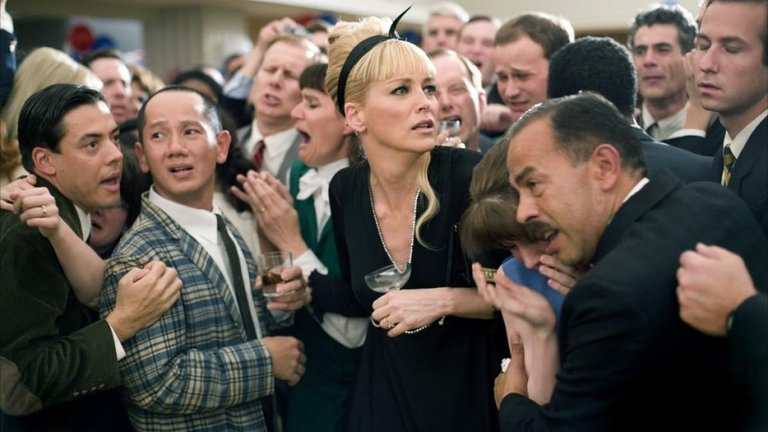Film Review: Bobby (2006)

In the annals of American and world history, 1968 might not hold the same significance as other years, but it was undoubtedly one of the most eventful periods. The year was marked by spectacular yet often traumatic events that shook the foundations of society, leaving an indelible imprint on the collective consciousness of the Baby Boomer generation. Among these pivotal moments, the subject matter of the 2006 drama film Bobby stands out as a particularly poignant chapter in American history.
Directed and written by Emilio Estevez, the movie is set on June 4th, 1968, at the Ambassador Hotel in Los Angeles. The US Democratic Party was holding its presidential primary elections in California, with Robert F. Kennedy, the New York senator and brother of assassinated President John F. Kennedy, emerging as the frontrunner to win the nomination. Kennedy represented the liberal wing of the party, having recently become a vocal advocate for the struggle against poverty, racism, and criticizing the administration's handling of the increasingly unpopular Vietnam War. Victory in California would virtually guarantee RFK's nomination and make him the favourite to win the general election against Republican nominee Richard M. Nixon. As the nation waited with bated breath for the primary results, a diverse cast of characters converged at the Ambassador Hotel, either staying or working there. Their seemingly unconnected stories would ultimately intertwine when RFK arrived at the hotel to celebrate his anticipated victory.
Those who follow current events, and especially this year's election season in the USA, won't fail to notice certain disturbing similarities between what happened very recently and what went on more than half a century ago. When Emilio Estevez made his film in 2006, he tried to establish historical parallels of his own, mainly between the unpopular war in Vietnam and the unpopular war in Iraq. Having grown up in a family of Martin Sheen, an actor known for his liberal and left-wing views, Estevez has wholeheartedly embraced the Kennedy Myth and it reflects in the portrayal of RFK as a saintly and charismatic leader who would have set America on the right path and saved future generations from nightmares like those embodied in George W. Bush, if not for what occurred at that fateful night in Los Angeles.
Many critics, even those few who don't subscribe to the Kennedy Myth, said that Estevez's heart was in the right place. However, Estevez chose a somewhat unconventional way to tell this story. RFK actually doesn't appear in the film directly; instead, he is portrayed through documentary footage, while the people he is supposed to lead into a bright new future are represented through a variety of characters that include hotel guests, staff, and campaign activists. Their stories are told in vignettes that are connected into a broader plot in a manner previously used in Grand Hotel and Altman's Nashville.
This approach also allowed Estevez to gather a diverse and impressive cast that includes veterans like Anthony Hopkins or Harry Belafonte, as well as newcomers like Lindsay Lohan. However, inevitable comparisons with classics that served as inspiration would make "Bobby" look inferior. Most of the vignettes are poorly written, characters, despite being decently played, aren't memorable, or are drenched in cliches like a drug dealer played by Ashton Kutcher.
Furthermore, there is a clear disconnect between those fictional stories and the real-life RFK who, in the film, looks more like a ghostly apparition than an embodiment of hopes and dreams of an entire generation. Despite high ambitions, Bobby turned into a massive failure both at the box office and among critics.
Only two years later, left-wing liberal America discovered another charismatic transformative figure in Barack Obama who would, unlike his unfortunate predecessor, actually reach the finish line. Consequently, Bobby lost much of its meaning and nowadays can be viewed as a curious relic of the past rather than an allegorical comment on America's future.
While Bobby may have been well-intentioned, it ultimately falls short in delivering a compelling narrative that does justice to the historical events and figures it seeks to portray. Despite its impressive cast and unconventional storytelling approach, the film's shortcomings make it a disappointing watch for anyone hoping to gain a deeper understanding of one of the most pivotal moments in American history.
RATING: 3/10 (+)
Blog in Croatian https://draxblog.com
Blog in English https://draxreview.wordpress.com/
InLeo blog https://inleo.io/@drax.leo
Hiveonboard: https://hiveonboard.com?ref=drax
Rising Star game: https://www.risingstargame.com?referrer=drax
1Inch: https://1inch.exchange/#/r/0x83823d8CCB74F828148258BB4457642124b1328e
BTC donations: 1EWxiMiP6iiG9rger3NuUSd6HByaxQWafG
ETH donations: 0xB305F144323b99e6f8b1d66f5D7DE78B498C32A7
BCH donations: qpvxw0jax79lhmvlgcldkzpqanf03r9cjv8y6gtmk9
Posted Using InLeo Alpha